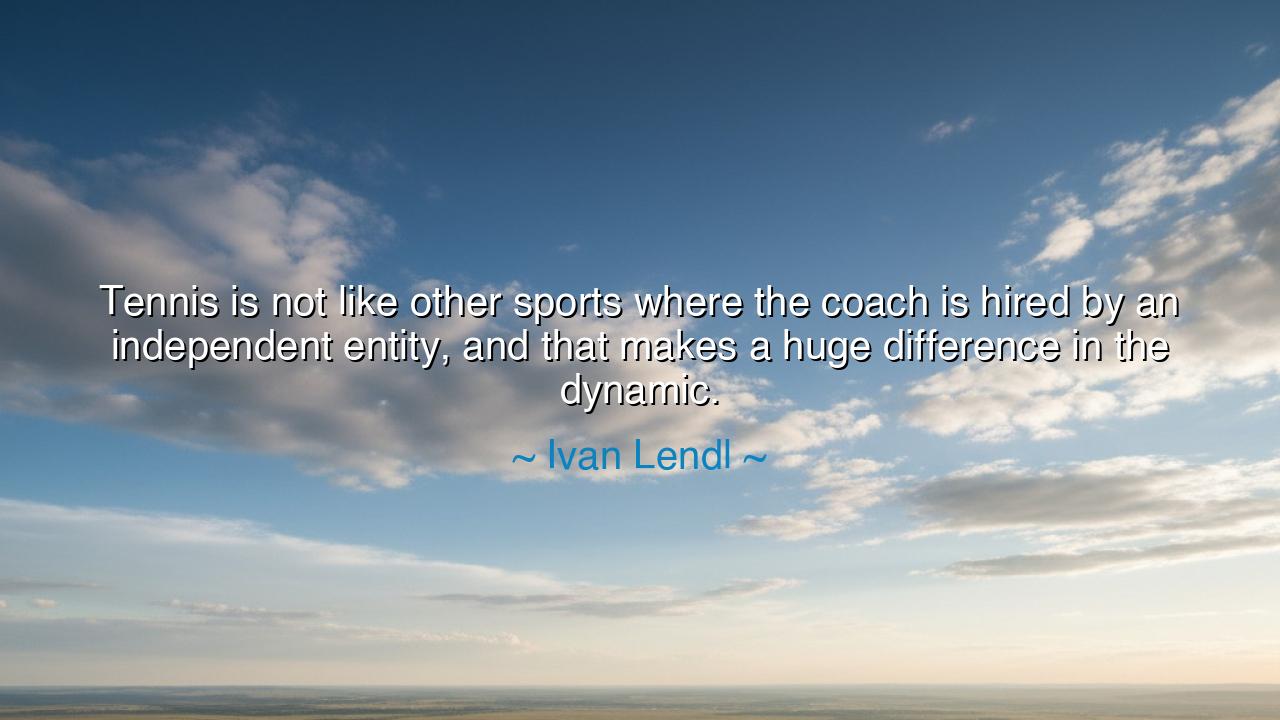
Tennis is not like other sports where the coach is hired by an
Tennis is not like other sports where the coach is hired by an independent entity, and that makes a huge difference in the dynamic.






"Tennis is not like other sports where the coach is hired by an independent entity, and that makes a huge difference in the dynamic." Thus spoke Ivan Lendl, master of the court, who knew not only the weight of trophies but the deeper truths of discipline and power. In these words, he unveils the singular character of tennis, a sport unlike others, where the relationship between athlete and coach is not mediated by club, franchise, or team, but forged directly, face-to-face, between player and guide. It is a bond more personal, more fragile, and more demanding than in most other games.
In sports such as football, basketball, or baseball, the coach stands above, appointed by owners or organizations. Players are commanded, directed, and sometimes discarded by the will of institutions larger than themselves. The coach is bound not to a single athlete but to the collective, serving the goals of the many. But in tennis, the opposite reigns: the coach serves at the pleasure of the player. The athlete, often a solitary warrior upon the court, chooses who will shape his training, his strategy, and his spirit. The dynamic thus becomes intimate, even precarious—for when victory falters, it is often the coach who bears the blame, dismissed with the stroke of a pen.
This truth is no abstraction, but one lived by Lendl himself. In his prime, he stood as a titan of endurance and power, carrying his game through years of dominance. Later, as a coach, he guided Andy Murray to his long-awaited triumphs, breaking the drought of British tennis. But in this bond, as in all such bonds, the relationship was not one of institution but of individuals: Murray could end it, shift it, redefine it at any moment. And so Lendl, speaking from both sides of the net, reveals the precariousness of a world where the coach is servant not of a system, but of a single will.
History echoes with similar bonds between mentor and pupil. Consider Aristotle and Alexander the Great: not hired by a kingdom’s council but chosen to guide a young prince. Their relationship shaped a conqueror’s mind and heart, but when Alexander came into his own, he walked beyond Aristotle’s reach. So too in tennis: the coach may shape the player, but the player, grown in power and independence, ultimately rules his own destiny. This is both the strength and the fragility of such a bond.
The lesson here is profound. In life, as in tennis, there are times when guidance is personal, not institutional. The mentor is chosen, the teacher accepted, not by the command of a larger body but by the consent of the one being guided. This requires humility on both sides: the coach must serve with patience, knowing his position is never guaranteed, and the player must respect the wisdom offered, knowing that independence without guidance can quickly turn to isolation.
This dynamic also teaches the weight of responsibility. In team sports, blame and success are spread across many shoulders. In tennis, the player stands alone, but he does not arrive there unaided. His choice of coach, his willingness to listen, his openness to correction—all are part of his fate. When triumph comes, the glory is his; when defeat arrives, the coach often departs. Such is the solitude of the athlete who rules his own household of training.
Practical action follows. If you are the one who seeks guidance, choose your teachers wisely, with both trust and discernment. If you are the one who guides, give your wisdom freely but hold it lightly, for your place depends upon loyalty, not decree. And whether player or coach, remember that greatness in such relationships arises not from command, but from mutual respect, honesty, and the courage to adapt.
Thus Ivan Lendl, with the clarity of experience, reminds us that tennis is a mirror of life itself: solitary, personal, defined by choices, and shaped by relationships that rest not on institutions but on the fragile yet powerful thread of trust. The dynamic makes all the difference—for in tennis, as in life, the coach is not appointed by the world, but chosen by the heart.






AAdministratorAdministrator
Welcome, honored guests. Please leave a comment, we will respond soon